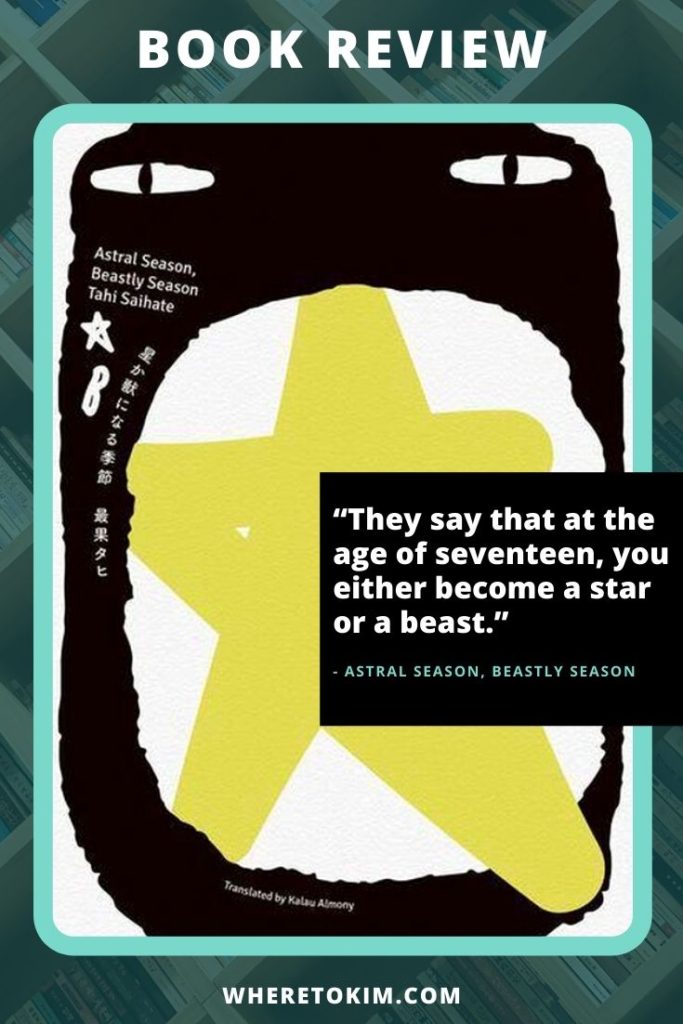Astral Season, Beastly Season by Tahi Saihate is a story about adoration and objectification. What does it take to grow up as a star instead of a beast?
Location: mostly in Tokyo, with short trips to Kyoto and Osaka
Astral Season, Beastly Season synopsis
Astral Season, Beastly Season is the debut novel by Japanese writer Tahi Saihate. The story follows Morishita and Yamashiro, two high-school boys approaching the age in life when they must choose what kind of people they want to be. When their favourite J-pop idol kills and dismembers her boyfriend, Morishita and Yamashiro unite to convince the police that their idol’s act was in fact by them. This thrilling novel is a meditation on belonging, the objectification of young popstars, and teenage alienation.
Book review
As you grow up, you discover who you are. It is often not as simple as being right or wrong and most people are not purely good or bad. There are many nuances and Tahi Saihate has captured them well. What someone is to others is not the same as what that person is to you. When that is the case, what do you do with your feelings?
Beginning as a lighthearted tale of adoration and obsession, the story soon takes on a darker tone. Let me illustrate the mood with a quote from the second story: “My empty, dried-out organs gurgled and swayed on the chair. That was my heart’s attempt at beating. My best attempt at living.”
I love you because...
The boys are big fans of an idol in a J-pop group. Their reasons for supporting that person are different than you might expect. They like her because she tries. There is some wishful thinking in the fact that it is enough to not be good at anything but work hard. The effort they put in to protect her is not implausible, especially if you’ve ever seen obsessed fans. If not, try visiting a fan store of a J-pop group in Tokyo.
The first story is addressed to the idol. As you read this story, keep in mind that the ‘you’ is the idol, and not the person to whom the narrator is talking or the reader. This can lead to temporary confusion. The formatting both helps, and doesn’t help, because even though the narrator’s part of the dialogue is formatted differently, you sometimes unconsciously associate the ‘you’ with someone else. In a sense, this extends the worship beyond the book itself.
Objectification
Astral Season, Beasly Season is about adolescents who grow up to be either a beast or a star. Two terms that hold more meaning than you might think before starting this book. The strong connections between the global idol and the popular kid in the classroom, and between the anonymous fan and the invisible kid in the classroom got me thinking. I will probably re-read this book to re-examine the thoughts I had while reading.
It is through elements like these that Astral Season, Beastly Season shines brightly, even in the dark of night. In so many ways, this book is well written and translated. Every character serves a purpose. The moral struggle is real, often more for the reader than for the characters.
Interested?
Get your copy of Astral Season, Beastly Season from Amazon.
Book details
Title: Astral Season, Beastly Season
Author: Tahi Saihate
Translator: Kalau Almony
Publisher: Honford Star
Pages: 144
ISBN (13): 9781916277106
Publication date: 15 January 2021
About the author and translator
Tahi Saihate is a young, multitalented writer who made her first foray into fiction with Astral Season, Beastly Season. She has received numerous awards, including the Gendaishi Techo Prize for Poetry and the Nakahara Chūya Prize. Her writing has been the inspiration of a movie, a rock song, and a 2018 exhibition by several prominent artists at the OTA Art Museum and Library. In 2019, Tahi had an exhibition of her own visual artwork at the Yokohama Museum of Art.
Kalau Almony was born and raised in Kailua, Hawaii. He has previously translated two novels by Fuminori Nakamura and a story by Nao-cola Yamazaki. Kalau received his BA in Comparative Literature from Brown University and his MA in East Asian Languages and Literature from the University of Hawaii Manoa.







